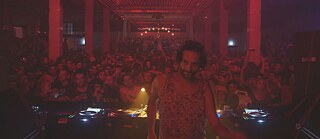Techno Worlds

12/05/2022–01/01/2023
Online
USADetails
Language: German and other languages with English subtitlesPrice: Free
gfo-newyork@goethe.de
Related links
A film series curated by C. Spencer Yeh
This online film series was curated by C. Spencer Yeh and is presented by the German Film Office as part of the Goethe-Institut’s traveling “Techno Worlds” exhibition. The nine films listed below are available for free streaming in the U.S. and Canada through Goethe on Demand, December 5 through January 1.
Watch now
C. Spencer Yeh:
I understand “techno” to be a form of music that holds a very particular definition. It doesn’t function the way we assume other music functions—individual tracks, while they are excellent to spin from top to bottom, don’t offer the same listening experience as a song, or a jazz standard, or a movement from a classical piece. Techno is electronic Black music that originated in Detroit, MI, as a sonic tool created for the purpose of dancing. The tracks are building blocks, carefully crafted and designed to fit together, not only in the way they move and change but in terms of the specific frequencies the key elements occupy—and subsequently sound and feel in particular sound systems. It is not enough to just have that beat to make something techno. Perhaps that is why so many artists and producers are also DJs as well—the creation of the track is just a piece of the puzzle. How it hits and fits into a live mix is crucial.
Much like other forms of Black music such as jazz and soul, techno found a deeper audience over the Atlantic. In becoming a techno capital, Berlin is now arguably more orthodox and hardline about what truly defines techno but that’s where “founder’s syndrome” really kicks in—in the second wave, people who love something too much can’t trust others to adequately keep the spirit alive. I can’t say I blame them.
The idea of this film series is not for me to limit or control what “techno” is, but rather to immerse myself in it and help people understand it for what it is, on its own terms—above all, to respect that world. Thinking about where techno and film can intersect, I hope that the resulting film selection helps fill in spaces that the “Techno Worlds” exhibition can’t quite cover in the same way. What’s interesting is that, after some amount of research and viewing, there is actually very little in terms of addressing and representing techno in movies. We have films that cover club culture, party life, DJs, drugs, synthesizers, Berlin streets, nighttime, dusk to dawn, all of that. But apart from a small handful of documentaries, still preciously little gets close to what I personally understand techno to be and mean. A majority of the movies in this program actually cover trance music, not techno, and I’m going to step out of the room for that discussion. But these representations and interpretations of what “techno” has become are what we have, and so we must go ahead. My ideal is to present works that complement and are in conversation with each other, but are not redundant. Each brings their own unique picture and message to the whole of the program.
I’d like to thank Sara Stevenson and the German Film Office for this very unique opportunity to take something that, to this day, is so heavy to me—techno—and to think, watch, listen, and share the results. I’d also like to thank Aaron Siegel of Fit Sound for some key advice and contacts, and Jon Dieringer of Screen Slate for being such a champ and champion. Finally, thank you to all the techno and electronic dance music experts, practitioners, thinkers, etc. I’ve been adjacent to over the years and who have helped me understand and experience this music and culture.
C. Spencer Yeh is recognized for interdisciplinary activities as an artist, improviser, and composer, as well as for his music project Burning Star Core. In 2019, Yeh received the Foundation for Contemporary Arts Grants to Artists award. His video works are distributed by Electronic Arts Intermix. Yeh was a programmer and trailer editor for Spectacle Theater, a microcinema in Brooklyn, NY, is on the current advisory board for Montez Press Radio, and is a contributing editor for BOMB Magazine and Triple Canopy.
Ben Hardyment, Berliner Trance (Germany, 1993, 26 min.)
Greg Harrison, Groove (USA, 2000, 86 min.)
Michael Dowse, It’s All Gone Pete Tong (Canada/UK, 2004, 90 min.)
Tilmann Künzel, SubBerlin-Underground United (Germany, 2008, 89 min.)
Michael M. Bilandic, Happy Life (USA, 2011, 73 min.)
Sebastian Schipper, Victoria (Germany, 2015, 138 min.)
Jacqueline Caux, Never Stop: A Music That Resists (France, 2017, 76 min.)
Romuald Karmakar, If I Think of Germany at Night (Germany, 2017, 105 min.)
David Dietl, Berlin Bouncer (Germany, 2019, 87 min.)